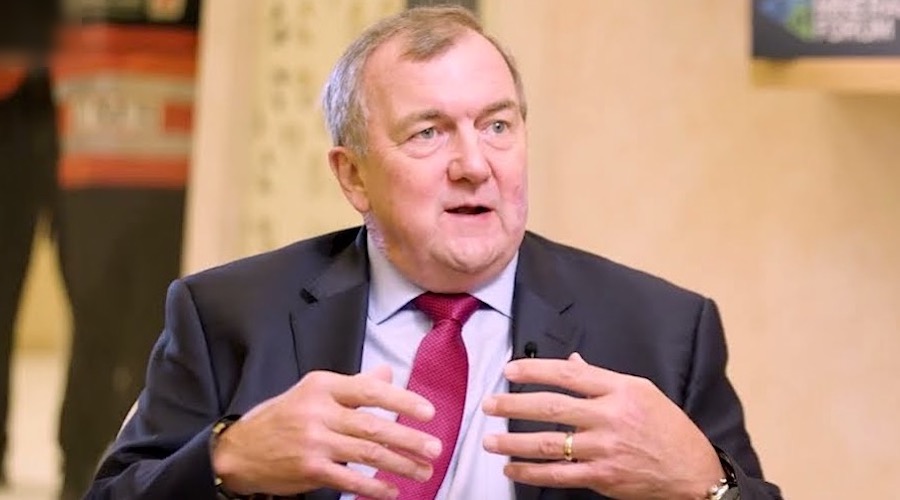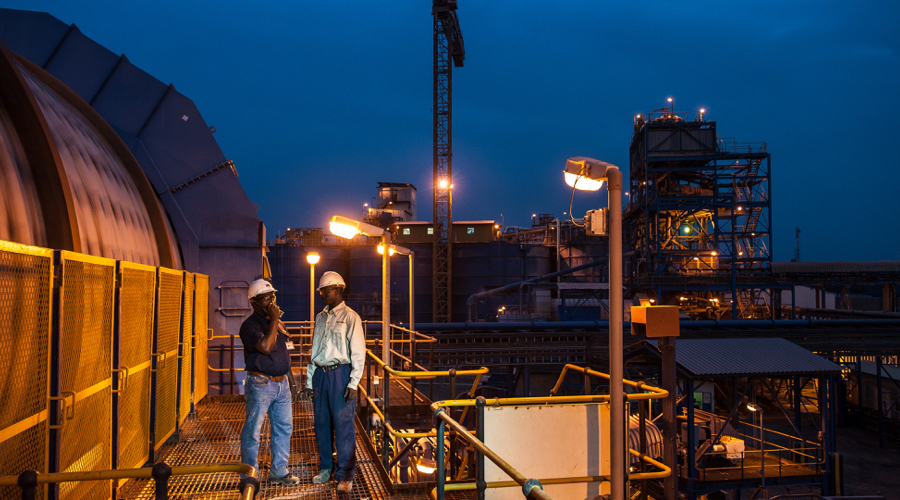Cecilia Jamasmie | January 14, 2025 |

Barrick CEO Mark Bristow. (Image courtesy of Future Mineral TV.)
Barrick Gold (NYSE:GOLD)(TSX:ABX) followed through on Tuesday with its threat to suspend operations at its Loulo-Gounkoto complex in Mali after the military-led government moved gold stocks to a custodial bank over the weekend.

The Canadian mining giant described the decision as “regrettable” but necessary, emphasizing its commitment to resolving the dispute.
“Barrick remains committed to constructive engagement with the Malian government and all stakeholders to find an amicable solution that ensures the long-term sustainability of the Loulo-Gounkoto mining complex and its vital contribution to Mali’s economy and communities,” it said in the statement.
The world’s second largest gold miner by market capitalization did not say what amount of the precious metal had been seized and transported by helicopter to the state-owned Banque Malienne de Solidarité (BMS) in the capital Bamako. Reuters reported on Monday the value of the gold taken by the Malian government is estimated to be around $245 million.
Barrick’s shares remained relatively unchanged, trading at $15.45 as of 10:10 a.m. in New York and at C$22.32 in Toronto. The stock has dropped over 20% since Mali initially issued threats against the company in October.
The suspension follows months of escalating tensions between Barrick and the Malian government, which claims the miner owes it $512 million in back taxes. The division of economic benefits from the Loulo-Gounkoto complex, which produced nearly 700,000 ounces of gold in 2023, remains an issue after Mali revised its mining code in 2023 to give the state higher stakes in projects
.

The Loulo-Gounkoto mine. (Archive image, courtesy of Randgold Resources, which merged with Barrick)
Since early December, the country, which owns a 20% stake in the Loulo-Gounkoto complex, has restricted gold shipments from the site.
“The inability to ship gold not only affects operations but has broader implications for the local economy, the 8,000 employees, and the many local service providers,” chief executive Mark Bristow said earlier this week.
Barrick initiated arbitration proceedings in December through the International Centre for the Settlement of Investment Disputes (ICSID) while simultaneously pursuing negotiations to establish a new memorandum of agreement with the Malian government. The proposed document seeks to resolve disputes, redefine their partnership, and increase Mali’s share of the complex’s economic benefits.
The situation has been further complicated by the continued detention of several of Barrick’s Malian employees on what the company describes as “unfounded charges.” The country also issued an arrest warrant for Bristow.
Since early December, the country, which owns a 20% stake in the Loulo-Gounkoto complex, has restricted gold shipments from the site.
“The inability to ship gold not only affects operations but has broader implications for the local economy, the 8,000 employees, and the many local service providers,” chief executive Mark Bristow said earlier this week.
Barrick initiated arbitration proceedings in December through the International Centre for the Settlement of Investment Disputes (ICSID) while simultaneously pursuing negotiations to establish a new memorandum of agreement with the Malian government. The proposed document seeks to resolve disputes, redefine their partnership, and increase Mali’s share of the complex’s economic benefits.
The situation has been further complicated by the continued detention of several of Barrick’s Malian employees on what the company describes as “unfounded charges.” The country also issued an arrest warrant for Bristow.
Economic bedrock
The suspension of all activities at Loulo-Gounkoto and the tense standoff with authorities come at a critical time for Mali’s mining industry, which faces the complexities of political instability and a revamped regulatory framework.
Since commissioning a sector-wide audit in 2022 and introducing new industry legislation two years ago, the Malian junta has been urging mining investors to renegotiate the economic terms of their contracts with the state.
The junta, which came to power over two coups in 2020-21, has also squeezed millions from other Western gold miners, such as Resolute Mining (ASX, LON: RSG). In November, Mali detained CEO Terry Holohan and two other employees for nearly two weeks before the company agreed to pay $160 million.
Other companies operating in Mali have had better luck. Allied Gold (TSX: AAUC) signed a 10-year deal on its Sadiola mine with Mali in September and B2Gold (TSX: BTO)(NYSE-A: BTG) agreed with the government separately the same month on the Fekola mine.
On Jan. 6, Barrick set a seven-day deadline for Mali to remove the export limits and resolve the dispute over Loulo-Gounkoto. The complex accounts for about 14% of Barrick’s forecast output this year. Mali, Africa’s second-largest gold producer, depends on the metal for 80% of its exports.
Barrick’s Loulo-Gounkoto complex, developed during Bristow’s tenure as CEO of Randgold before its acquisition by Barrick in 2018, is a cornerstone of Mali’s economy. Over the past 29 years, the company has invested more than $10 billion in the country, contributing between 5% and 10% of Mali’s GDP annually. Last year alone, Barrick injected over $1 billion into the local economy.
The mine complex is also one of Mali’s largest taxpayers and employers, with 97% of its 8,000-strong workforce being Malian nationals. According to Barrick, more than 70% of the economic benefits from the complex have gone directly to the Malian state.
Barrick Suspends Mali Gold Operations as Standoff Escalates
By William Clowes and Katarina Höije
By William Clowes and Katarina Höije
January 14, 2025
(Bloomberg) -- Barrick Gold Corp. said it’s suspending mining operations in Mali after the government started removing gold from the nation’s biggest mine in the latest escalation of a months-long dispute.
The world’s No. 2 gold producer is stopping activity at the vast Loulo-Gounkoto complex, the firm said in a statement on Tuesday. The move comes about a week after the company warned it would be forced to take such action if the authorities in the West African country continued to restrict exports and disrupt operations.
Shares of Barrick were little changed, trading at $15.45 at 10:10 a.m. in New York. The company’s stock has fallen more than 20% since Mali first threatened Barrick in October.
Barrick and Mali’s military rulers are locked in a standoff over the distribution of revenue from an asset that’s key for both the company and the government. The state has blocked Barrick from shipping the precious metal out of the country since November, started seizing gold stockpiled at the mine and put out an arrest warrant for Chief Executive Officer Mark Bristow. The miner has begun arbitration proceedings against Mali.
“Barrick has regrettably initiated the temporary suspension of operations while it continues to work towards a resolution,” the statement said.
Loulo-Gounkoto is one of the largest gold mines on the planet and only Barrick’s flagship Carlin asset in Nevada provides the Toronto-based firm with more output and income. In 2023, the mine accounted for more than a third of Mali’s formal gold exports and made payments of 278 billion CFA francs ($433 million) to the cash-strapped state, according to the Extractive Industries Transparency Initiative.
The government has begun executing a seizure order against the mine and moved “existing gold stock” to a custodial bank, according to Barrick’s statement. The company said on Jan. 6 that an “interim attachment order” had been issued for gold on site at Loulo-Gounkoto.
Mali Pressure
The Malian junta has been pressuring mining investors to renegotiate the economic terms of contracts with the state ever since commissioning a sector-wide audit in 2022 and introducing new legislation for the industry last year.
The government’s position is that Barrick owes back taxes and should accept the updated mining code. The company has said the audit’s findings are “flawed” and the revised law should have “no application” to existing mines.
Whereas gold production in the country is dominated by western operators, companies active in the nascent lithium mining sector are either owned or financed by Chinese firms.
Other large gold producers in Mali – including B2Gold Corp. – have already announced settlements with the government that involve large payments to the state and higher royalty rates. Barrick previously offered to pay about $370 million to bring the dispute to an end.
--With assistance from Jacob Lorinc.
(Updates shares in third paragraph.)
©2025 Bloomberg L.P.
(Bloomberg) -- Barrick Gold Corp. said it’s suspending mining operations in Mali after the government started removing gold from the nation’s biggest mine in the latest escalation of a months-long dispute.
The world’s No. 2 gold producer is stopping activity at the vast Loulo-Gounkoto complex, the firm said in a statement on Tuesday. The move comes about a week after the company warned it would be forced to take such action if the authorities in the West African country continued to restrict exports and disrupt operations.
Shares of Barrick were little changed, trading at $15.45 at 10:10 a.m. in New York. The company’s stock has fallen more than 20% since Mali first threatened Barrick in October.
Barrick and Mali’s military rulers are locked in a standoff over the distribution of revenue from an asset that’s key for both the company and the government. The state has blocked Barrick from shipping the precious metal out of the country since November, started seizing gold stockpiled at the mine and put out an arrest warrant for Chief Executive Officer Mark Bristow. The miner has begun arbitration proceedings against Mali.
“Barrick has regrettably initiated the temporary suspension of operations while it continues to work towards a resolution,” the statement said.
Loulo-Gounkoto is one of the largest gold mines on the planet and only Barrick’s flagship Carlin asset in Nevada provides the Toronto-based firm with more output and income. In 2023, the mine accounted for more than a third of Mali’s formal gold exports and made payments of 278 billion CFA francs ($433 million) to the cash-strapped state, according to the Extractive Industries Transparency Initiative.
The government has begun executing a seizure order against the mine and moved “existing gold stock” to a custodial bank, according to Barrick’s statement. The company said on Jan. 6 that an “interim attachment order” had been issued for gold on site at Loulo-Gounkoto.
Mali Pressure
The Malian junta has been pressuring mining investors to renegotiate the economic terms of contracts with the state ever since commissioning a sector-wide audit in 2022 and introducing new legislation for the industry last year.
The government’s position is that Barrick owes back taxes and should accept the updated mining code. The company has said the audit’s findings are “flawed” and the revised law should have “no application” to existing mines.
Whereas gold production in the country is dominated by western operators, companies active in the nascent lithium mining sector are either owned or financed by Chinese firms.
Other large gold producers in Mali – including B2Gold Corp. – have already announced settlements with the government that involve large payments to the state and higher royalty rates. Barrick previously offered to pay about $370 million to bring the dispute to an end.
--With assistance from Jacob Lorinc.
(Updates shares in third paragraph.)
©2025 Bloomberg L.P.
No comments:
Post a Comment